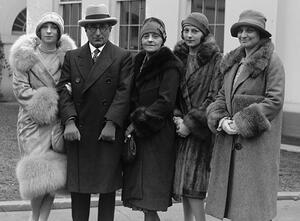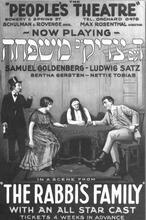Irene Mayer Selznick
Irene Mayer Selznick, the daughter of film executive Louis B. Mayer, helped her husband, David O. Selznick, run his movie production company before becoming a theater producer herself. Selznick moved to Hollywood in 1918 and married in 1930, unifying two Hollywood dynasties. In 1936 she became an executive of her husband’s new production company, whose films included A Star Is Born and Gone with the Wind. During World War II, Selznick worked as a juvenile probation officer in Los Angeles before moving east and joining the NY Citizen Council on Crime and Delinquency. She divorced her husband in 1945 and began a career as a theater producer, famously producing A Streetcar Named Desire. In 1985 she became president of the Louis B. Mayer Foundation and supported the Dana-Farber Cancer Institute and the Young Playwrights Foundation.
Irene Mayer Selznick’s career as a producer in the New York theater began in 1947 as Act III of her life. She writes in her memoir, A Private View (1983), that Act I was spent under the shadow of her father, the film executive Louis B. Mayer; Act II was marriage to David O. Selznick, producer of Gone With the Wind; and Act III consisted of her role as herself and her career as a Broadway producer. She is perhaps best known as producer of Tennessee Williams’s A Streetcar Named Desire (1947). She also produced Bell, Book and Candle (1950), The Chalk Garden (1955), and The Complaisant Lover (1961), among others.
Early Life and Family
Irene Mayer Selznick was born on April 2, 1907, to Louis B. and Margaret (Shenberg) Mayer. Her paternal and maternal grandparents had come to New Brunswick, Canada, in the early 1880s from Vilna and Kovno on the then Russian-Polish border. Her family lived in Haverhill, Massachusetts, where she and her older sister, Edie, attended public school. Then in 1918, the year of the Spanish influenza epidemic, the family moved to California. There her father built MGM into the most respected studio in Hollywood. Despite Louis B. Mayer’s intentions, the family succumbed to the rarefied atmosphere of early Hollywood as it existed for wealthy movie executives. They met and socialized with the famous people of the day, which was a problem for Irene Mayer because of a stutter, acquired at school where, as a left-hander, she was forced to write with her right hand.
Her marriage to David O. Selznick, son of Lewis J. Selznick, in 1930 united two of Hollywood’s dynasties. “Movies were like a great cause to us,” she writes in her autobiography. “We had one romance with each other and another with the movies.” Visits to New York in the 1930s forged the real beginning of Selznick’s connections in the theater, and laid the groundwork for her career as producer. With David Selznick, she met George and Beatrice Kaufman, Philip Barry, Robert Sherwood, John Hay Whitney, Henry Luce and William Paley.
Producing work
Irene Selznick was an executive of her husband’s production company, founded in 1936 following the success of Dinner at Eight, which was made in three and a half weeks. When Selznick told her husband she was “sick of phony films about Hollywood,” he produced A Star Is Born in 1937, starring Janet Gaynor and Frederic March. Gone With the Wind was released in 1939 to enormous acclaim.
During the war, Irene Selznick underwent psychoanalysis in Los Angeles with Dr. May Romm, and took a wartime job as a Los Angeles County juvenile probation officer. After she moved east, she sat on the board of directors for the New York Citizen Council on Crime and Delinquency.
“I wasn’t looking for independence or freedom,” she wrote about the end of her marriage. “I preferred protection; I had had it all my life.” But in 1945, she and David Selznick were separated, though they were not divorced until 1948. Their marriage produced two sons, Lewis Jeffrey Selznick and Daniel M. Selznick.
She was “shoved into the theater” by her friend Moss Hart, who urged her to hang out her producer’s shingle. Her first play was Heartsong (1947) by Arthur Laurents, which closed out of town, but the one that followed later that same year was Tennessee Williams’s A Streetcar Named Desire. Mel Gussow, New York Times drama critic, in writing about Selznick’s Broadway career, said, “When she produced Streetcar and other plays, she worked hand in glove with the playwright in insuring that the work was seen absolutely to its best advantage.” Lifelong awareness of drama and character in movies enabled her to listen for and value the voice of the writer.
Legacy
From 1985 to her death in New York on October 10, 1990, at age eighty-three, Irene Mayer Selznick was president of the Louis B. Mayer Foundation. Breaking the foundation’s tradition of gifts to film schools and institutes, she was responsible for a gift of five million dollars to the Dana-Farber Cancer Institute of Boston. In her will, she left a hundred thousand dollars to the Young Playwrights Foundation to provide income for travel and housing for talented new writers. In this way she ensured her continued involvement in the new young voices of theater and screen.
Notable Names in the American Theatre (1976).
Rigdon, Walter, ed. The Biographical Encyclopedia and Who’s Who of the American Theatre (1966).
Selznick, Irene Mayer. Papers. Boston University Library, Boston University, and A Private View (1983).




